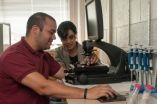(Press-News.org) Just as women are advised to get plenty of folic acid around the time of conception and throughout early pregnancy, new research suggests another very similar nutrient may one day deserve a spot on the obstetrician's list of recommendations.
Consuming greater amounts of choline – a nutrient found in eggs and meat – during pregnancy may lower an infant's vulnerability to stress-related illnesses, such as mental health disturbances, and chronic conditions, like hypertension, later in life.
In an early study in The FASEB Journal, nutrition scientists and obstetricians at Cornell University and the University of Rochester Medical Center found that higher-than-normal amounts of choline in the diet during pregnancy changed epigenetic markers – modifications on our DNA that tell our genes to switch on or off, to go gangbusters or keep a low profile – in the fetus. While epigenetic markers don't change our genes, they make a permanent imprint by dictating their fate: If a gene is not expressed – turned on – it's as if it didn't exist.
The finding became particularly exciting when researchers discovered that the affected markers were those that regulated the hypothalamic-pituitary-adrenal or HPA axis, which controls virtually all hormone activity in the body, including the production of the hormone cortisol that reflects our response to stress and regulates our metabolism, among other things.
More choline in the mother's diet led to a more stable HPA axis and consequently less cortisol in the fetus. As with many aspects of our health, stability is a very good thing: Past research has shown that early exposure to high levels of cortisol, often a result of a mother's anxiety or depression, can increase a baby's lifelong risk of stress-related and metabolic disorders.
"The study is important because it shows that a relatively simple nutrient can have significant effects in prenatal life, and that these effects likely continue to have a long-lasting influence on adult life," said Eva K. Pressman, M.D., study author and director of the high-risk pregnancy program at the University of Rochester Medical Center. "While our results won't change practice at this point, the idea that maternal choline intake could essentially change fetal genetic expression into adulthood is quite novel."
Pressman, who advises pregnant women every day, says choline isn't something people think a lot about because it is already present in many things we eat and there is usually no concern of choline deficiency. Though much more research has focused on folate – functionally very similar to choline and used to decrease the risk of neural tube defects like spina bifida – a few very compelling studies sparked her interest, including animal studies on the role of choline in mitigating fetal alcohol syndrome and changing outcomes in Down syndrome.
A long-time collaborator with researchers at Cornell, Pressman joined a team led by Marie Caudill, Ph.D., R.D., professor in the Division of Nutritional Sciences at Cornell, in studying 26 pregnant women in their third trimester who were assigned to take 480 mg per day, an amount slightly above the standard recommendation of 450 mg per day, or about double that amount, 930 mg per day. The choline was derived from the diet and from supplements and was consumed up until delivery.
The team found that higher maternal choline intake led to a greater amount of DNA methylation, a process in which methyl groups – one carbon atom linked to three hydrogen atoms – are added to our DNA. Choline is one of a handful of nutrients that provides methyl groups for this process. The addition of a single methyl group is all it takes to change an individual's epigenome.
Measurements of cord blood and samples from the placenta showed that increased choline, via the addition of methyl groups, altered epigenetic markers that govern cortisol-regulating genes. Higher choline lessened the expression of these genes, leading to 33 percent lower cortisol in the blood of babies whose mom's consumed 930 mg per day.
Study authors say the findings raise the exciting possibility that choline may be used therapeutically in cases where excess maternal stress from anxiety, depression or other prenatal conditions might make the fetal HPA axis more reactive and more likely to release greater-than-expected amounts of cortisol.
While more research is needed, Caudill says that her message to pregnant women would be to consume a diet that includes choline rich foods such as eggs, lean meat, beans and cruciferous vegetables like broccoli. For women who limit their consumption of animal products, which are richer sources of choline than plant foods, she adds that supplemental choline may be warranted as choline is generally absent in prenatal vitamin supplements.
"One day we might prescribe choline in the same way we prescribe folate to all pregnant women," notes Pressman, the James R. Woods Professor in the Department of Obstetrics and Gynecology. "It is cheap and has virtually no side effects at the doses provided in this study. In the future, we could use choline to do even more good than we are doing right now."
###
In addition to Pressman and Caudill, several scientists and clinicians from the Division of Nutritional Science and the Statistical Consulting Unit at Cornell and the Cayuga Medical Center in Ithaca, N. Y., participated in the research. The study was funded by the Egg Nutrition Center, the National Cattlemen's Beef Association, the Nebraska Beef Council, the U.S. Department of Agriculture and the President's Council of Cornell Women. The funding sources had no role in the study design, interpretation of the data, or publication of the results.
Nutrient in eggs and meat may influence gene expression from infancy to adulthood
Implications for wide range of disorders –- hypertension to mental health problems
2012-09-20
ELSE PRESS RELEASES FROM THIS DATE:
Data link project provides new insight about the US R&D activities of multinational companies
2012-09-20
Findings from the Research and Development Data Link Project showed that both parent companies of U.S. multinational companies and U.S. affiliates of foreign multinational companies devoted about three-fourths of their R&D expenditures to development activities in 2007.
This newly developed information is from the Research and Development Data Link Project--a joint project of the National Science Foundation, U.S. Census Bureau and Bureau of Economic Analysis.
In linking surveys from these three agencies, the Data Link Project provided more comprehensive information ...
Ergonomic Nursing Pillow with Innovative Features Benefits New Moms
2012-09-20
The Sweet Oasis nursing pillow, designed to help mothers nurse more comfortably, is now available via the web and in select baby boutiques throughout the Denver area.
Designed by a breastfeeding mom, the Sweet Oasis pillow makes nursing more comfortable for mother and baby by ergonomic and secure positioning every feeding. The Sweet Oasis nursing pillow's patent-pending design, intended for nursing or bottle-feeding on the caregiver's lap, aligns baby in a healthy, inclined position; provides greater stability and safety; and washes and carries easily.
Mother and ...
Genetic mutation may have allowed early humans to migrate throughout Africa, research says
2012-09-20
WINSTON-SALEM, N.C. – Sept. 19, 2012 – A genetic mutation that occurred thousands of years ago might be the answer to how early humans were able to move from central Africa and across the continent in what has been called "the great expansion," according to new research from Wake Forest Baptist Medical Center.
By analyzing genetic sequence variation patterns in different populations around the world, three teams of scientists from Wake Forest Baptist, Johns Hopkins University School of Medicine and the University of Washington School of Medicine, Seattle, demonstrated ...
Clemson psychology professor conducts sleep research at Vienna university
2012-09-20
CLEMSON — Clemson University psychology professor June Pilcher returned recently from Austria, where she worked with University of Vienna researchers to study ways college students' sleep habits affect how they function socially.
Pilcher received a Fulbright-Freud Award to work with the Social, Cognitive, Affective and Neuroscience Unit (SCAN) at the University of Vienna. She also worked with the Sigmund Freud Museum, giving a series of talks and lectures.
Pilcher participated in research with the university's SCAN unit, a center that conducts research in the fields ...
Satellite sees post-Tropical Cyclone Lane fizzle in a blanket of low clouds
2012-09-20
Former Hurricane Lane has fizzled and its remnant circulation was spotted in a blanket of low clouds in the Eastern Pacific Ocean.
NOAA's GOES-15 satellite sits in a fixed orbit over the western U.S. and captures continuous visible and infrared imagery of the western U.S. and the Eastern Pacific Ocean. On Sept. 19 at 11:45 a.m. EDT, GOES-15 captured a visible image of post-tropical Lane's remnants that appear as a small circulation center. The center was located over 1,000 miles from Baja California in an extensive field of stratocumulus clouds. Stratocumulus clouds are ...
Evolution is as complicated as 1-2-3
2012-09-20
EAST LANSING, Mich. — A team of researchers at Michigan State University has documented the step-by-step process in which organisms evolve new functions.
The results, published in the current issue of Nature, are revealed through an in-depth, genomics-based analysis that decodes how E. coli bacteria figured out how to supplement a traditional diet of glucose with an extra course of citrate.
"It's pretty nifty to see a new biological function evolve," said Zachary Blount, postdoctoral researcher in MSU's BEACON Center for the Study of Evolution in Action. "The first ...
Study shows how consumers shift expectations and goals
2012-09-20
NEW YORK - September 19, 2012 - Sally and Harry are about to invest in their company's 401(k) plan. Sally chooses the best performing mutual fund, which has high risks but boasts a 25 percent year-to-date return. Harry, after considering the tradeoffs between risks and rewards, opts for a lower performing fund with an 8 percent year-to-date return. When they receive their next quarterly performance reports, both Sally and Harry discover that their funds have met their initial expectations. Are they satisfied? If not, why? And how could their levels of satisfaction be improved?
One ...
Using a laser to 'see' the smallest world
2012-09-20
(Santa Barbara, Calif.) –– A multi-university team has employed a high-powered laser based at UC Santa Barbara to dramatically improve one of the tools scientists use to study the world at the atomic level. The team used their amped-up electron paramagnetic resonance (EPR) spectrometer to study the electron spin of free radicals and nitrogen atoms trapped inside a diamond.
The improvement will pull back the veil that shrouds the molecular world, allowing scientists to study tiny molecules at a high resolution.
The team, which includes researchers from UCSB, University ...
UGA researchers boost efficacy of drugs by using nanoparticles to target 'powerhouse of cells'
2012-09-20
Athens, Ga. - Nanoparticles have shown great promise in the targeted delivery of drugs to cells, but researchers at the University of Georgia have refined the drug delivery process further by using nanoparticles to deliver drugs to a specific organelle within cells.
By targeting mitochondria, often called "the powerhouse of cells," the researchers increased the effectiveness of mitochondria-acting therapeutics used to treat cancer, Alzheimer's disease and obesity in studies conducted with cultured cells.
"The mitochondrion is a complex organelle that is very difficult ...
Johns Hopkins astrophysicist spies ultra-distant galaxy amidst cosmic 'dark ages'
2012-09-20
With the combined power of NASA's Spitzer and Hubble space telescopes as well as a cosmic magnification effect, a team of astronomers led by Wei Zheng of The Johns Hopkins University has spotted what could be the most distant galaxy ever detected.
Light from the young galaxy captured by the orbiting observatories shone forth when the 13.7-billion-year-old universe was just 500 million years old.
The far-off galaxy existed within an important era when the universe began to transit from the so-called "Dark Ages." During this period, the universe went from a dark, starless ...
LAST 30 PRESS RELEASES:
Scientists deliver new molecule for getting DNA into cells
Study reveals insights about brain regions linked to OCD, informing potential treatments
Does ocean saltiness influence El Niño?
2026 Young Investigators: ONR celebrates new talent tackling warfighter challenges
Genetics help explain who gets the ‘telltale tingle’ from music, art and literature
Many Americans misunderstand medical aid in dying laws
Researchers publish landmark infectious disease study in ‘Science’
New NSF award supports innovative role-playing game approach to strengthening research security in academia
Kumar named to ACMA Emerging Leaders Program for 2026
AI language models could transform aquatic environmental risk assessment
New isotope tools reveal hidden pathways reshaping the global nitrogen cycle
Study reveals how antibiotic structure controls removal from water using biochar
Why chronic pain lasts longer in women: Immune cells offer clues
Toxic exposure creates epigenetic disease risk over 20 generations
More time spent on social media linked to steroid use intentions among boys and men
New study suggests a “kick it while it’s down” approach to cancer treatment could improve cure rates
Milken Institute, Ann Theodore Foundation launch new grant to support clinical trial for potential sarcoidosis treatment
New strategies boost effectiveness of CAR-NK therapy against cancer
Study: Adolescent cannabis use linked to doubling risk of psychotic and bipolar disorders
Invisible harms: drug-related deaths spike after hurricanes and tropical storms
Adolescent cannabis use and risk of psychotic, bipolar, depressive, and anxiety disorders
Anxiety, depression, and care barriers in adults with intellectual and developmental disabilities
Study: Anxiety, gloom often accompany intellectual deficits
Massage Therapy Foundation awards $300,000 research grant to the University of Denver
Gastrointestinal toxicity linked to targeted cancer therapies in the United States
Countdown to the Bial Award in Biomedicine 2025
Blood marker from dementia research could help track aging across the animal world
Birds change altitude to survive epic journeys across deserts and seas
Here's why you need a backup for the map on your phone
ACS Central Science | Researchers from Insilico Medicine and Lilly publish foundational vision for fully autonomous “Prompt-to-Drug” pharmaceutical R&D
[Press-News.org] Nutrient in eggs and meat may influence gene expression from infancy to adulthoodImplications for wide range of disorders –- hypertension to mental health problems







